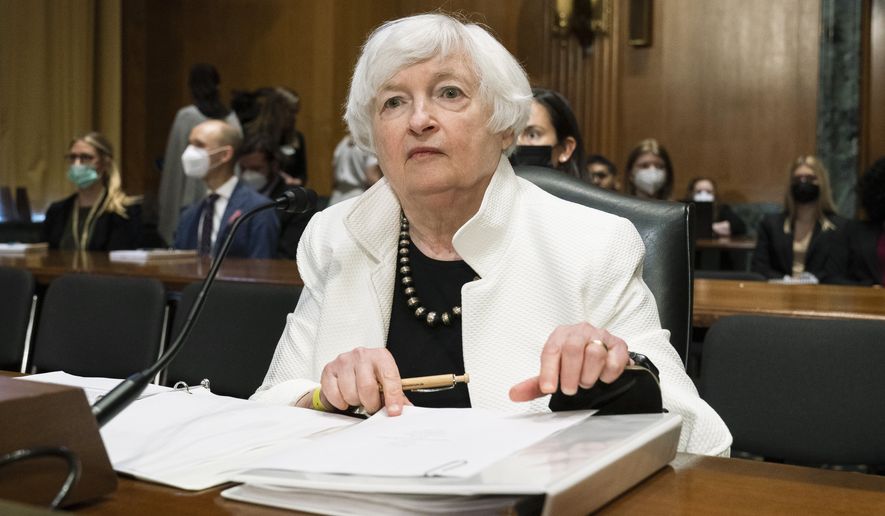Lawmakers on Tuesday grilled Treasury Secretary Janet Yellen over high inflation and soaring gas prices, saying the Biden administration’s big spending and clean energy agenda has left Americans worse off.
A week after admitting that she was “wrong” about persistent inflation that climbed to a 40-year high of 8.5% this spring, Ms. Yellen told the Senate Finance Committee that consumer prices remain at “unacceptable levels.”
Sen. John Thune, South Dakota Republican, asked Ms. Yellen why she predicted last year that high inflation would be “transitory.” She said she was “not anticipating” multiple variants of COVID-19 or Russia’s invasion of Ukraine, both of which she blamed for longer-term inflation.
Ms. Yellen said she and Federal Reserve Chairman Jerome Powell “probably could have used a better term than ‘transitory’” to forecast inflation.
“I do expect inflation to remain high, although I very much hope that it will be coming down now,” she said.
Ms. Yellen said reducing inflation “should be our number one priority,” urging lawmakers to pass legislation to reduce the cost of prescription drugs and utility bills.
SEE ALSO: Treasury Secretary Janet Yellen admits she was wrong on inflation
Lawmakers from both parties said families are hurting. Republicans blamed President Biden’s $1.9 trillion American Rescue Plan in 2021 for sparking higher prices.
“The result, which many predicted, has been inflation at highs not seen in 40 years,” said Sen. Mike Crapo, Idaho Republican.
Republican Sen. Steve Daines of Montana said the president has blamed high inflation on corporate greed, Russia’s war in Ukraine, supply-chain woes — everything except Democrats’ big spending in the past year.
“The one thing we’ve not heard the administration say is there may have been a contributing factor with the $1.9 trillion spending package that was passed in March of 2021 by this Congress,” Mr. Daines said.
Ms. Yellen replied, “We’ve seen high inflation in almost all developed countries around the world, and they have very different fiscal policies. So it cannot be the case that the bulk of the inflation that we’re experiencing reflects the impact of the ARP.”
While inflation has climbed in many other countries, data at the start of this year showed the U.S. was near the top of the list on inflationary increases.
Democrats didn’t openly blame the administration’s policies, but they agreed with Republicans that families are struggling. Finance Committee Chairman Ron Wyden, Oregon Democrat, said it was the major topic of discussion at recent town-hall meetings in his state.
“People are feeling it at the grocery store and at the gas pump,” Mr. Wyden said, noting that gas has hit an average cost of $5.42 per gallon in Oregon.
Mr. Wyden said the job market is the “strongest in generations,” and wages are rising steadily.
“But in terms of what our families are feeling on the ground, inflation is causing real headaches,” he said.
Ms. Yellen had few answers for a quick turnaround on consumer prices. Many of her responses focused on the need over the next few years for Americans to switch to solar and wind power, and to move away from a petroleum-based economy.
“Over the medium term, the critical thing is that we become more dependent on the wind and the sun that are not subject to geopolitical influences,” Ms. Yellen said.
Sen. Debbie Stabenow, Michigan Democrat, said she recently purchased an electric vehicle and enjoyed driving past higher-priced gas stations.
“I got it and drove it from Michigan to here [Washington] last weekend, went by every single gas station, and it didn’t matter how high [gas] was,” Ms. Stabenow said with a smile.
She told Ms. Yellen that global supply-chain problems have caused inflation.
“You didn’t create that, President Biden didn’t,” Ms. Stabenow said. “It’s great political theater to point and say prices are up. My reaction is ‘duh.’”
Sen. Bill Cassidy, Louisiana Republican, questioned why the administration would propose to decrease tax incentives for U.S. oil and gas producers at a time of record-high gas prices.
“That’s going to decrease supply and contribute to that upward pressure,” Mr. Cassidy told Ms. Yellen.
The Treasury secretary replied, “Over the medium term, we absolutely need to move to renewables.”
Mr. Cassidy interrupted her, saying, “But I’m speaking about right now. If we decrease tax incentives, that will decrease supply, and yet the administration is proposing to do that.”
He asked whether the administration would propose increasing incentives for U.S. oil producers.
“I think it’s profitable as it is,” Ms. Yellen said. “The price system is working and provides incentives.”
Sen. Pat Toomey, Pennsylvania Republican, criticized the administration’s plan to “throw out” the Trump-era tax cuts with a proposal to raise taxes on wealthier Americans and corporations.
“We had the best economy of my lifetime, by far,” Mr. Toomey said. “It was working best for low-income Americans: record low poverty, median household income at an all-time high. The wage growth was faster than the rate of inflation … contrary to today, where wage growth is not keeping up with inflation.”
He said federal tax revenue “surged” under the Trump plan, despite Democrats’ warnings that it would reduce tax receipts.
“So the Biden administration comes along and looks at all this data and says, ‘Let’s throw out the tax reform,” Mr. Toomey said. “That’s unbelievable. I’m very concerned about the impact that the [Biden] proposal would have on American competitiveness.”
• Dave Boyer can be reached at dboyer@washingtontimes.com.




Please read our comment policy before commenting.